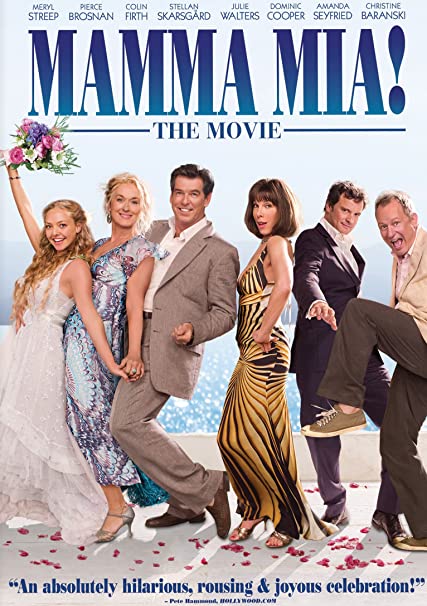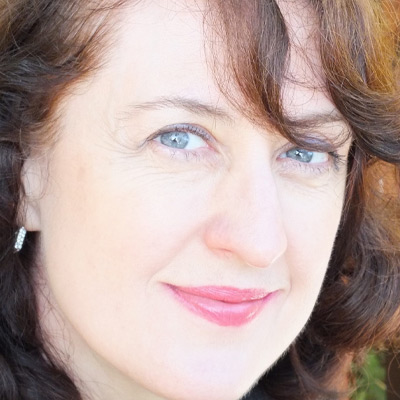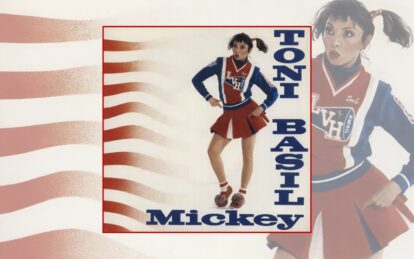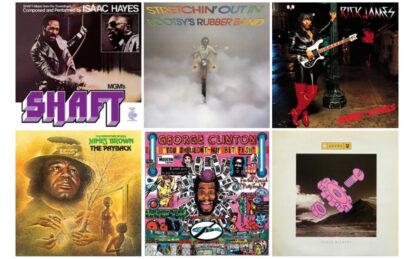
ABBA: Mamma Mia! poster
Adored the world over, the global reach of ABBA now extends to a box office record-breaking musical and movie. Classic Pop looks at the twin phenomenon that is Mamma Mia!
On any given day, numerous different productions of ABBA: Mamma Mia! – the musical inspired by ABBA’s mammoth hits – plays somewhere round the globe. Its subsequent silver screen spin-off, Mamma Mia! The Movie, is now one of the most successful film musicals ever. Not for nothing are songwriting partners Benny and Björn, cited as fourth best-selling artists of all time.
It was while the pair were working on the West End to Broadway musical, Chess with Tim Rice, in around 1983, that they first met theatrical producer Judy Craymer. The determined 20-something had risen through the ranks from stage manager of the original production of Cats, to Tim Rice’s production assistant and onto his executive producer of Chess.
Inspired by the drama of The Winner Takes It All – Björn’s ultimate break-up hit song – Craymer had the lightbulb idea of setting ABBA’s best-loved songs in a stage context.
Initially, the guys were not overly keen on the concept, and it took the would-be impresario 10 years to persuade them to give her the rights to their most treasured works. However, once in agreement, they were artistically involved from the start, along with ABBA’s Anni-Frid in a financial capacity.
Said to have sealed the deal was the pitching of a top-notch creative team – Andersson and Ulvaeus were already on good working terms with Craymer as proposed producer.
The script by ‘savvy writer’, Brit playwright Catherine Johnson was promptly sanctioned; while director Phyllida Lloyd impressed with her previous high-end output of Brecht and Shakespeare. Firing on all fronts, Craymer put everything on the line to make it all happen, selling her flat and giving up her day job in the process.
By 1997, the musical juggernaut was well and truly on its way. It lived up to its billing: ‘The storytelling magic of ABBA’s timeless songs with an enchanting tale of family and friendship unfolding on a Greek island paradise.’
It was a surprisingly modern narrative centred round the wedding of a girl who had invited her three possible biological fathers to her important event. On the fictional Greek island of Kalokairi, Sophie aches for her father to walk her down the aisle – but does not know his identity. Discovering her mother’s old diary by chance, she finds entries recording romantic dates with three men in swift succession.
Thinking one of these may well be her father, ahead of the wedding she sends an invite out to each in the guise of her unsuspecting mother, Donna. As Donna is caught up with meeting guests at her taverna including old best friends (and ex-bandmates) Tanya and Rosie, in turn Sophie secretly meets each of her mother’s ex-lovers.
Shocked to see the men after all this time, Donna exits overcome with emotion. Soon confusion reigns for both mother and daughter, with all three men wanting to escort Sophie on her big day.
The somewhat soap-opera story breezes by ably abetted by a string of ABBA pearls including Super Trouper, Lay All Your Love On Me, Dancing Queen, Knowing Me, Knowing You, Take A Chance On Me, Thank You For The Music, Money, Money Money, The Winner Takes It All, Voulez Vous, and of course, Mamma Mia! – the title track taken from the band’s 1975 smash.
Various plot twists and turns later, it all resolves with a giant ‘sing’ in the tale via I Do, I Do, I Do, I Do, I Do, and I Have A Dream, before a lively audience interacting finale and reprise of Mamma Mia and Dancing Queen.
The non-stop ABBA jukebox musical proved to mesmerise an audience like no other production before or (so far) since. Currently entering its 18th year, the London production has now been seen by more than 10 per cent of the population.
Following its London premiere in 1999, the album ABBA Gold notably topped the UK charts again. By 2001, the musical opened on Broadway, and has now played in more than 40 countries in all six continents – to a worldwide audience of more than 60 million.
Not surprisingly, Hollywood soon came calling. As Craymer later related, after all her hard slog: “There was no way I was going to sell the rights and have someone else do it.” True to what would become her indomitable reputation as “the greatest showbiz impresario of the 21st century”, she wisely insisted on refusing all Tinseltown offers until reaching an agreement to helm the film herself along with the original key team: Catherine Johnson as writer, and Phyllida Lloyd, directing. She fought suggestions for other experienced directors (such as Steven Spielberg) to take over.
Equally, insistence was made that the musical’s central middle-aged, hippie mother character remained just so. Politely declined were mentions of casting younger glamour girls like Kylie Minogue, and favoured from the start, was Meryl Streep. Self declared ‘lifelong ABBA fan’ Streep stated: “I am Mamma Mia!” on being cast, and said it was one of the happiest roles of her life.
She explained she’d found watching the 2001 Broadway musical version ‘life-affirming’ in the wake of the 9/11 Twin Towers tragedy, and thus made contact via a congratulations note, with Craymer.
Finally, actor Tom Hanks offered to make it on the Brit producer’s strict terms with his production company, and soon a useful ‘ABBA-mad’ high-up at Universal Pictures got things moving.
Besides Streep – as spirited, single mother Donna – the stellar cast boasted Amanda Seyfried as her daughter Sophie, Julie Walters and Christine Baranski as her best friends, and as the trio of love interests, Swedish actor Stellan Skarsgard, ex ‘Mr Darcy’ Colin Firth and former 007, Pierce Brosnan.
Ironically, as well as the main film location of the gorgeous Greek island of Skiathos, Donna’s villa in the film was in reality a set shot on the 007 stage at Pinewood Studios.
Most external shots, with the exception of the seaside hamlet of Damouchari in the Pelion region, were filmed on Kastani beach, on the small island of Skopelos. The beach bar and jetty were temporarily built for showcase song and dance numbers: who can forget the highlight of the cast strutting their collective stuff to Dancing Queen with such joy on the jetty? – all to that ABBA soundtrack.
Eagle-eyed ABBA fans may have spotted cameos by Benny Andersson as the Dancing Queen piano player, while more uncharacteristically, Björn Ulvaeus played a ‘blink and he’s gone’ Greek god!
Cast-wise, most naturally attuned to the ABBA repertoire, and known for their singing ability, was Meryl Streep. Having taken opera singing lessons as a child, she had previously performed in films including Postcards From the Edge, Silkwood, and most recently, Florence – about opera singer Florence Foster Jenkins.
Consequently among the movie’s many awards, she was Golden Globe nominated for best actress. The fact that some of the cast had not been chosen for their vocalising led to some mixed reviews from critics. Most especially Pierce Brosnan, who may have looked the part but somehow didn’t quite sound it – and as a result, won the Golden Raspberry award for worst supporting actor.
At least he had a great time making the film – “one of the best jobs ever”, he said. “The Mamma Mia! experience that has been created and given people so much joy on the stage has bled into this film.” The cast certainly looked like they were having a ball and allegedly, were whooping it up after hours, as contrary to usual film-making stipulations, producer Judy kept the party mood going with beers all-round for cast and crew.
Coming up to a decade after the movie was made, fans still make pilgrimages to the locations, particularly the picturesque – but admittedly petite – Ioannis white chapel used in the wedding scene. Beyond the likes of Grease and Dirty Dancing, Mamma Mia! instantly became the song and dance hit of the decade.
Packing in a cracking 24 ABBA hits, as a feel-good escape, it more than hit the mark. As Meryl Streep summed up: “It’s about dreams, your hopes, your happiness.” Opening in 2008, it opened at No. 1 in 35 countries.
Craymer had staked all on its success. In the 90s money had been so tight that on the verge of bankruptcy, she had had to sell her house. In interviews in the British press, she later related: “All my friends thought I was crazy. They said ABBA was so passe and I should get over it. But I knew everyone would want to see the musical. I had to make people believe in what I was doing and it became a complete obsession.”
Read more: Making ABBA’s Waterloo
Read more: Making ABBA’s Ring Ring
Her choice to, in effect, ‘take a chance’ on ABBA paid dividends to an astounding degree: overall from her Mamma Mia! concepts, she is reported to have made a reported £90 million.
Awarded an MBE, she went on to produce Viva Forever!, the 2012 musical based on the Spice Girls’ hits, and now spends much of her off-duty time fund-raising for Mamma Mia!-linked charities such as Breast Cancer Research.
In much the same way, Bristol writer Catherine Johnson shares a similar ‘roughing it to riches’ backstory. Her colourful life could itself create a compelling screenplay. Expelled from school at 16, married at 18, divorced at 24, she was a hard-up single mum with another child on the way when entering – and winning – a newspaper playwriting competition changed her life.
Her hard-hitting play, Rag Doll was staged by the Bristol Old Vic, and penning further plays followed – including Bay City Rollers-based Shang-A-Lang – before stints on popular UK TV series such as Casualty, Band Of Gold and Byker Grove.
ABBA: Mamma Mia! – Here We Go Again trailer
Recommended to producer Judy Craymer by a mentor friend, she found the idea of the ABBA project entertaining but over-familiar with financial hardship, did not take its commercial chances seriously. For that matter, neither did ABBA’s Björn: “I didn’t have a clue that Mamma Mia! would be a worldwide success,” he later admitted.
For the two years it took to write the book, it was a ‘scary-ish time’ for Johnson. “I couldn’t afford for things to go wrong,” she said, looking back on the time. It’s now well-known that Johnson deliberately wrote the plot about a single mother – notably one ‘who wasn’t as the press often liked to paint, a drain on the state… a working single mother who had got her life together and the relationship she had with her daughter.’
As she told The Guardian: “I’ve had less years of being a success than I had of being a failure. For a lot of my life, I felt a complete letdown”.
Consequently, though she has gone onto create other plays, she is happy if Mamma Mia! is fated to remain her career’s masterwork. Having initially given the musical a lifespan of three months, it’s now going strong in its second decade, having amassed over an eye-watering £2 billion worldwide.
Bankrolling nearly $610 million on a $52 million budget, Mamma Mia! is the highest grossing musical film of all time in the UK. Such was its unprecedented success that co-chairman of Universal Studios David Linde, made a press statement that in years to come, there could be a sequel – adding he would be delighted if the creative quintet of Craymer, Johnson, Lloyd, Andersson and Ulvaeus reunited to create a follow-up based round other ABBA songs.
The world’s premiere may have taken place elsewhere, but on 4 July 2008, all eyes were on the Swedish film screening. In attending this, all four members of ABBA were photographed together for the first time in 22 years. It was aptly held on ABBA’s home turf in Stockholm, and at the Rival theatre – part of the boutique hotel owned by Benny, where each room has a copy of ABBA Gold – the album that spawned both memorable musical to movie productions. Agnetha and Anni-Frid arrived dancing with star of the movie Meryl Streep, before joining the ABBA boys and rest of the cast, on the balcony.
Enjoy this article on the making of ABBA: Mamma Mia! Then check out our feature on ABBA: The Movie
Check out ABBA’s official website here
Classic Pop may earn commission from the links on this page, but we only feature products we think you will enjoy.






